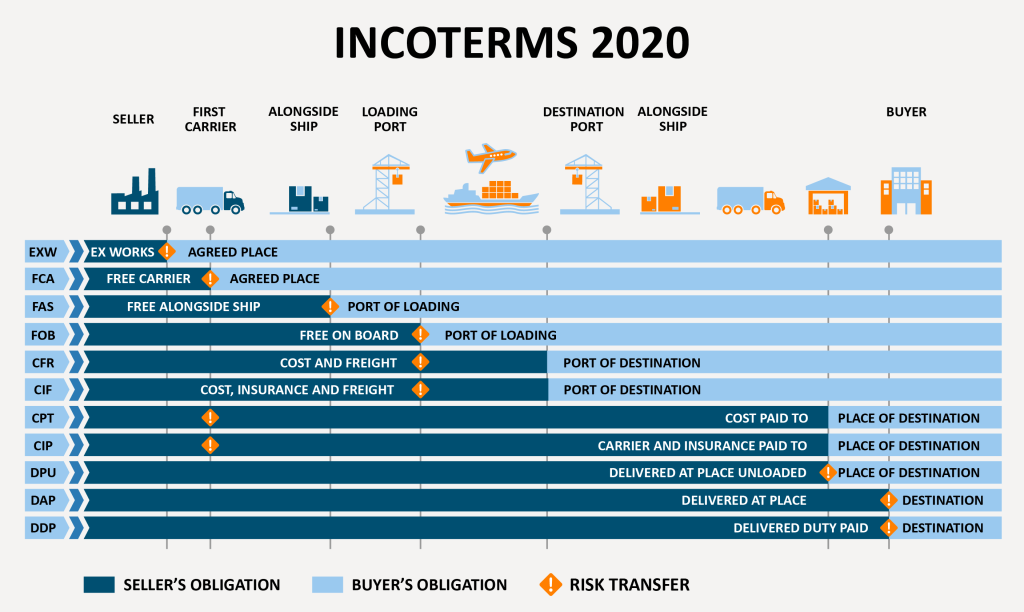From Port to Port: Understanding Incoterms for Sea Shipments Jan 24, 2024
Have you ever wondered about the significance of Incoterms in international trade? These standardized terms play a crucial role in both domestic and cross-border sales, defining the responsibilities of sellers and buyers in relation to the delivery of goods. The latest edition, Incoterms 2020, comprises 11 distinct terms that define the port or place where delivery is deemed to occur by the seller. In this article, we’ll delve into the intricacies of Incoterms, specifically focusing on those pertinent to sea shipments.
Understanding Incoterms:
In any sales contract involving sellers or buyers in Manitoba, it is imperative to explicitly outline the responsibilities of each party. These responsibilities encompass loading and unloading costs, insurance, payment of carriage, import and export taxes, and other associated expenses. A comprehensive understanding of these responsibilities not only enables sellers to provide accurate pricing but also empowers buyers to calculate the full purchase price, fostering transparency and reducing disputes in both domestic and international trade.

Incoterms for Sea Shipments
Let’s explore some key Incoterms applicable to sea shipments:
1. FAS – Free Alongside Ship:
Under FAS, delivery occurs when the seller places the goods alongside the buyer-nominated ship at the named port of shipment. From here, the buyer bears all costs, including carriage expenses and the risk of loss or damage during the goods transfer. Importantly, the buyer is not obligated to secure insurance.
For instance, imagine a Manitoba-based exporter selling 5,000 boxes of carrots to a UK buyer under FAS terms. The seller must package and load the carrots onto a transportation vehicle, arrange for export customs clearance and duties, deliver the goods to the vessel at the designated port of shipment (Port of Churchill), then issue an invoice and other necessary documentation. Once this has been completed, all costs and risks associated with transporting the goods are handled by the buyer, who must arrange for loading onto the vessel, main carriage, port handling fees, import customs clearance and duties, and delivery to the final destination.
2. FOB – Free On Board:
In the FOB arrangement, goods are delivered to the buyer on board the vessel nominated at the port of shipment. The buyer then arranges and bears the cost of carriage from the port of shipment. Similar to FAS, the buyer is not obliged to secure insurance, and if no specific loading point is stipulated by the buyer, the seller has the flexibility to choose a suitable location.
As an example, if a Manitoba company is exporting carrots to the UK under FOB Port Churchill, this means the seller (exporter) is responsible for the goods until they are loaded onto the vessel in Port Churchill, while the buyer arranges carriage.
3. CFR – Cost and Freight:
Under CFR, the seller delivers the goods on board the vessel, with no obligation for the buyer to arrange insurance. An example could be a Manitoba exporter delivering carrots to a Superstore in Germany, where the seller covers freight costs up to the port of Harburg for the subsequent delivery to the importer. Here the seller delivers the goods onboard the vessel and arranges carriage.
4. CIF – Cost, Insurance and Freight:
In CIF transactions, the seller delivers goods on board the vessel and is responsible for both transportation and insurance. The seller must provide insurance covering a minimum of 110% of the goods’ value, safeguarding the shipment from the point of delivery to the named destination. For instance, a Manitoba carrot grower exporting to a French company under CIF would need to cover transportation and insurance costs to the port in France.
In conclusion,
It’s crucial for both buyers and sellers to comprehend the implications and obligations associated with identified Incoterms. For more information, you can download the Incoterms 2020 app from the iOS or Android store.
For personalized support, consider booking an appointment with our Trade Advisors, who are ready to assist you in navigating the complexities of international trade.

This article was written by Yewande Olubowale
“As a WTC Winnipeg Trade Advisor, my goal is to provide Manitoban businesses with strategic trade advice. Don’t hesitate to reach out for guidance on your trade journey, challenges, or any related matters.”



